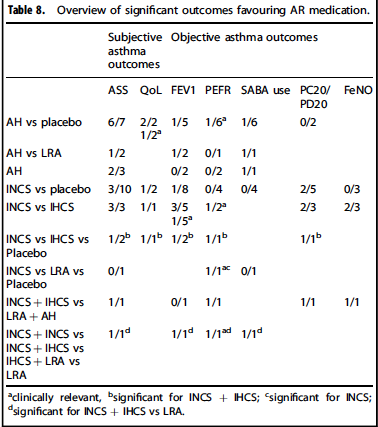
Tameeris, E., Bohnen, A.M., Bindels, P.J.E. et al. npj Prim. Care Respir. Med. 35, 4 (2025). https://doi.org/10.1038/s41533-024-00408-4

Abstract
Asthma and allergic rhinitis (AR) are common disorders of the respiratory tract that often coincide. Control of AR symptoms can improve asthma outcomes in patients with co-existing diseases. Our aim is to produce a systematic review of the effectiveness of conventional anti-AR medication for asthma outcomes in patients with both diseases. The Embase, Medline and Cochrane databases were searched for publications up to October 2024. Randomised controlled trials (RCTs) that reported objective (OAO) or subjective asthma outcomes (SAO) and compared the efficacy of anti-AR medication to placebo or conventional asthma medication were included. Included medication interventions were antihistamines (AH), corticosteroids and leukotriene receptor antagonists (LRA). We included thirty-three RCTs. Six had an exclusively paediatric study population, 17 a partially paediatric study population. No clinically relevant improvements were seen in SAO. Quality of life (QoL) showed a significant and clinically relevant improvement in five studies. A significant and clinically relevant improvement of OAO was seen in four studies. LRAs did not show significant improvements from baseline. When compared, corticosteroids performed significantly better than LRAs. Significant improvements in both OAO and SAO were seen more often in studies with AHs than with corticosteroids. Anti-allergic initiated AHs and corticosteroids seemed to have a positive effect on asthma outcomes, with AHs having the tendency to elicit more changes in outcomes than the other studied medication groups. LRAs do not seem to influence asthma outcomes. Most significant improvements were seen in QoL and OAO. SAO did not show clinically relevant improvements.
